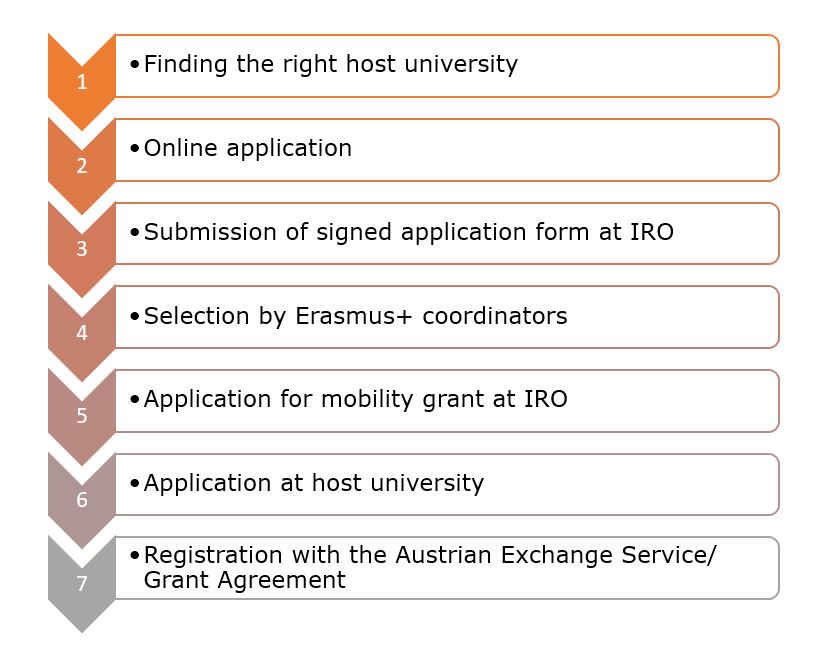Student mobility is most commonly implemented on the basis of existing bilateral agreements between the home and host institutions. Mobility in the context of such agreements offers a number of advantages such as a fee waiver at the host institution, comprehensive support by the International Relations Office at the home and host institutions, clear regulations for the recognition of credits earned at the other institution, and, in many cases, financial support in the context of funding programmes related to the agreements. The following paragraphs explain how the University of Graz handles outgoing student mobility in the context of Erasmus+ agreements with other programme country universities.
Outgoing Erasmus+ student mobility at the University of Graz
In general, all the mobility programmes managed by the International Relations Office (IRO) at the University of Graz are promoted both at faculty level and centrally, i.e. university-wide. The faculties offer special advisory sessions which introduce students to mobility programmes and provide information on what students planning to go abroad need to take into account, for example, with regard to choosing courses. Information is also provided via the faculty websites and through printed material available in the faculties, such as posters and information brochures.
The range of promotion and information activities at central level is wider and more varied. Mobility programmes for study, training and/or research abroad are promoted via different channels, including, for example, email newsletters for students, IRO website, Facebook, print material (e.g. information brochures, posters, postcards, bookmarks), go-abroad fairs and information sessions. Some of these channels also use testimonials by students who have already had a mobility experience abroad. Fairs and information sessions may also involve international students who are doing an exchange semester/year at the University of Graz telling local students about their mobility experience, their home countries and universities. This peer-to-peer sharing of experience is a very efficient tool in promoting mobility opportunities.
The information sessions on mobility programmes at the University of Graz typically advise students to consider the following questions when they are preparing for a stay abroad:
• When do I want to go abroad? Which semester (winter or summer semester; 3rd/4th semester of study programme)?
• Which courses do I want to take abroad? Which courses do I need to progress in my studies at home?
• What is the purpose of studying abroad? Courses versus Bachelor/Master thesis or internship?
• Do the courses offered at the host university match the curriculum at the home university?
• Are my language skills sufficient to study abroad? What is the language of instruction?
• When are the application deadlines?
The IRO at the University of Graz provides students planning to go abroad with an overview of all the relevant steps to be taken in the preparation of the mobility experience:

The University of Graz attaches great importance to a transparent selection procedure. Information on the selection, including the selection criteria, is therefore published on the IRO website. The students are selected by the Erasmus+ coordinator based on grade point average, progress in studies, motivation for the mobility experience, whether the proposed study programme is sophisticated and feasible, extracurricular activities (e.g. social engagement, mentor in buddy programme) and relevant language skills considering the language(s) of instruction at the host university. The Erasmus+ coordinators are lecturers at the University of Graz who are nominated by the departments and tasked with supporting the students academically. This typically involves organizing information sessions for their students, assisting in the choice of host institution, selecting and nominating candidates, answering questions on the learning agreement (e.g. choice of courses, course equivalency), confirming changes in the mobility duration (e.g. extension of stay), and communicating with the partner institutions.
After having been selected and nominated to the Austrian Exchange Service, which takes care of the scholarship payments for outgoing students in Erasmus+, and to the host universities, the students participate in information sessions at the University of Graz where they learn about the learning agreement, grant agreement and recognition process. The students are made aware that it is their own responsibility to ensure they have sufficient health, accident and liability insurance cover for their stay abroad. They are also advised to look into whether there are any specific visa requirements for the host country.
The paperwork relating to a stay abroad can be extensive and there are many administrative steps students need to take before, during and after the mobility placement. In order to help students keep track of when they need to do what, the IRO at the University of Graz offers checklists detailing the tasks and steps for each phase of the mobility. These checklists are tailored to the requirements per faculty. The IRO website provides students with information on how to proceed if they need to change the learning agreement, on the possibility of extending their stay abroad, required documentation, recognition, scholarship payment, and other relevant topics. Moreover, students are guided through the whole process – beginning with the application and ending with uploading the final documents – via the online application platform at the University of Graz. This platform consists of several parts corresponding to the different phases of the mobility experience and provides help texts and explanations.


